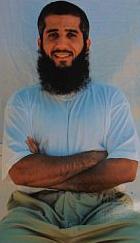|
|
|
Fayiz al Kandari. Image from the Miami Herald. |
An interagency periodic review board has found that a Kuwaiti held at Guantanamo, Fayiz Mohammed Ahmed Al Kandari, should remain in detention.
Al Kandari’s continued detention “remains necessary to protect against a continuing significant threat to the security of the United States,” the board wrote in an unclassified summary of its decision. The ruling is dated July 14, but was not released until today.
The review board concluded that al Kandari “almost certainly retains an extremist mindset and had close ties with high-level al Qaeda leaders in the past.” The board found al Kandari’s “desire to return to his family, which appears willing to help with his reintegration,” to be credible. But it also feared that he is susceptible “for recruitment due to his connections to extremists and his residual anger at the US.”
Another review board decision was also released today. In that case, a board recommended that Fouzi Khalid Abdullah Al Awda be transferred from Guantanamo to his home country of Kuwait. But while the interagency board believed al Awda when he said he wanted to give up extremism, the same cannot be said for al Kandari. The review board also found that a one-year rehabilitation program was appropriate in al Awda’s case, but not in al Kandari’s.
The board “noted a lack of history regarding the efficacy of the rehabilitation program Kuwait will implement for [al Kandari] with his particular mindset, but appreciates the efforts of the Kuwaiti government and encourages the officials at the Al Salam Rehabilitation Center [in Kuwait] to continue to work with the detainee at Guantanamo.”
Both al Awda and al Kandari were deemed “high” risks to “the US, its interests, and allies” by Joint Task Force Guantanamo (JTF-GTMO). Both were denied their petitions for a writ of habeas corpus by a DC district court. And President Obama’s Guantanamo Review Task Force determined that both of the Kuwaitis should be held in “continued detention” under the laws of war. That is, the task force concluded that both al Awda and al Kandari were “too dangerous to transfer but not feasible for prosecution.”
While al Awda will be transferred home, however, al Kandari will remain in US custody.
Admitted ties to senior al Qaeda leaders
The Long War Journal profiled al Kandari in October 2010, after his habeas petition was denied by a DC district court the previous month. [See LWJ report, Judge finds that Kuwaiti Gitmo detainee was no charity worker.]
Al Kandari repeatedly claimed that he was a mere charity worker in Afghanistan in 2001. The court disagreed, finding that al Kandari’s story was “implausible” and “not credible.”
When al Kandari entered Afghanistan, he made his way to the office of a group called Al Wafa, which posed as a charity but was really a front for al Qaeda.
The court found that al Kandari admittedly “met and associated with various members and high-level leaders of al Qaeda, the Taliban, or associated enemy forces.” Al Kandari met with some of these jihadists during the Battle of Tora Bora in late 2001.
There is also intelligence connecting al Kandari to an al Qaeda cell that attacked US Marines who were training on Faylaka Island in Kuwait. The attack, which was launched on Oct. 8, 2002, resulted in one Marine being killed and another injured. US officials think that al Kandari played a key role in inspiring and recruiting the cell. But the district court ruled that it was not necessary to consider al Kandari’s ties to the attackers, as the weight of the other evidence was enough to justify his detention.
One of al Kandari’s relatives, a terrorist known as Anas al Kandari, was killed during the assault on Faylaka Island. US officials found that Fayiz and Anas al Kandari received specialized training from al Qaeda in Kandahar. Al Qaeda spokesman Sulayman Abu Ghaith was trained alongside the pair, and Fayiz al Kandari has admitted knowing him.
Sulayman Abu Ghaith was taken into US custody in 2013. He admitted to FBI officials that he knew both Fayiz and Anas al Kandari, but also sought to downplay the extent of their relationship.









1 Comment
Obama is playing a dangerous game in releasing Guantanamo terrorists to fulfill his political promise.